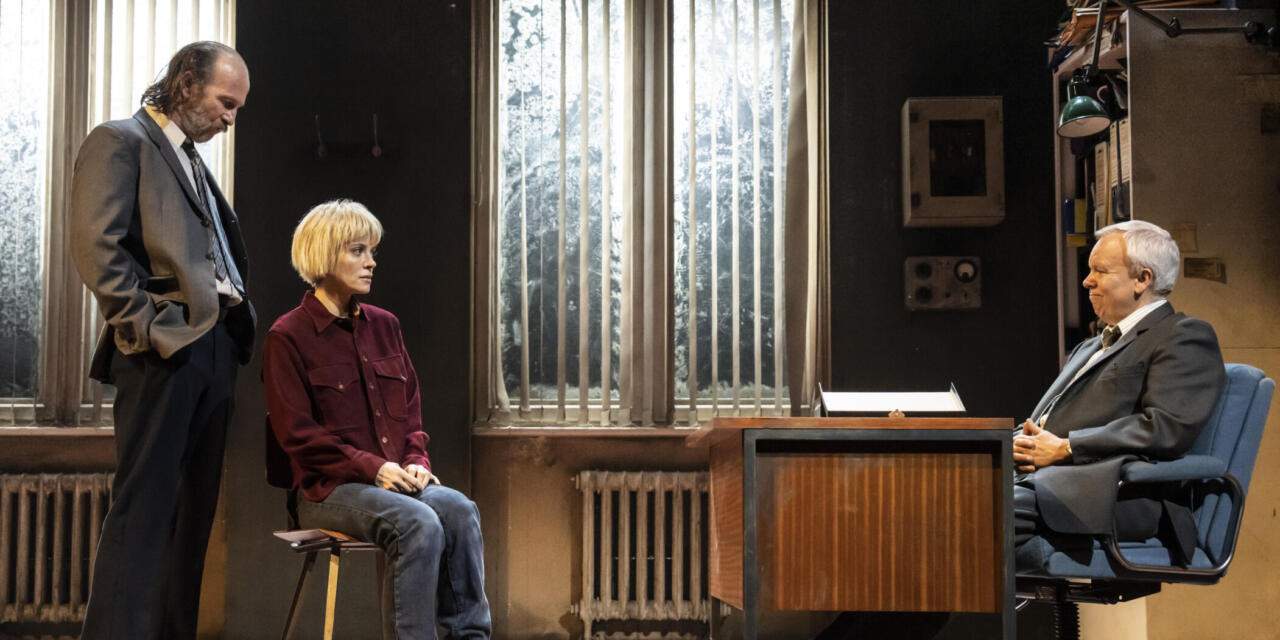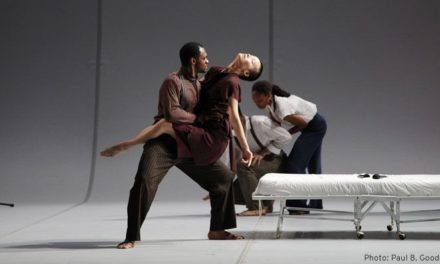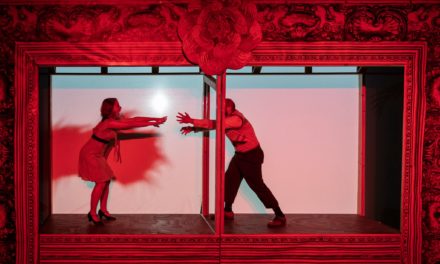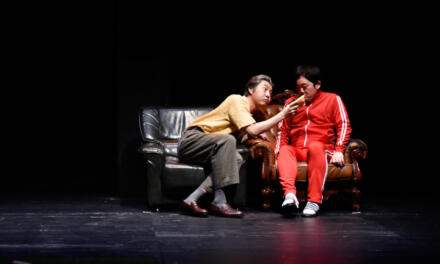Martin McDonagh is perhaps better known today globally for his recent accomplishments on screen as a writer and director, but he cut his teeth through his prodigious work as a playwright. First produced in 2003, The Pillowman remains one of McDonagh’s most popular plays, and rightly so: its unflinchingly dark tale of authorial imagination, intergenerational violence, and state brutality has no shortage of links to our contemporary world. Now, twenty years on, the play receives a major West End revival at London’s Duke of York’s Theatre, in a production directed by McDonagh’s long-time collaborator Matthew Dunster and starring Lily Allen as the writer Katurian—a character originally penned as male.
Ms. Katurian (in this take on the play) is being interrogated by detective Tupolski and policeman Ariel about the potential connection between her gruesome stories and a series of child-murders taking place in her town. Her older brother Michal, she finds out soon, has also been detained and allegedly tortured. As Katurian tries to understand just what it is that these men really want out of her, she decides that she must take swift action to make sure that her stories are not destroyed, even if this might cost her life. Lily Allen pitches her performance in the lead role rather naturalistically: hers is a matter-of-fact, at times unduly withdrawn, Katurian, who becomes particularly affecting whenever she grows alarmed about the fate of her life’s work.
But the real gem of the evening is Steve Pemberton’s Tupolski, whose brilliant blend of calculated mercilessness and wry humour makes for a deliciously difficult man. His narration of his own story, once we get there, is a delight to behold. Paul Kaye’s Ariel—the bad cop to Tupolski’s supposedly good one—neatly reveals the tenderness hidden deep behind his gruff demeanour. By the end, he quietly strikes us as the more compassionate of the two officers. Matthew Tennyson’s Michal, too, is a welcome surprise, in that he interprets the character as suggestively affected and youthful, rather than naïve and infantile—a hilariously sarcastic and funny person whose learning disabilities and painful history of abuse come out only through the cracks.
As McDonagh’s script dictates, the production features hauntingly vivid recreations of two of Katurian’s stories involving child torture, incorporating sleek projections by Dick Straker and disconcertingly modulating sounds by Ian Dickinson. There is a real punch to seeing actual children embody these roles (Madelynne Mills and Darcy Crosby on press night): their sheer presence conveys an essential sense of physicality that illuminates the real stakes of Katurian’s dark and disturbing writings. Anna Fleischle’s set design retains our focus on realistically rendered but duly grim interiors—an interrogation room and a holding cell—with faded colours and Neil Austin’s stark, shadow-prone lighting. Seeing this consciously delocalized story realized in settings with material specificity lets us contemplate the range of locales where these events might be unfolding.
This revival of the play is particularly interested in the beguiling, immersive powers of storytelling, as well as their causal relations to individual subjectivity. There are forceful moments when Ariel, whom we learn to have been sexually abused as a child, seems to understand and appreciate why Katurian is so attached to her work, which bears testament to, and stems from, her own history of abuse. Though not manifested as fully as it should have been, the intricately chummy relationship between Katurian and Michal also tells us something about how these siblings’ shared past of trauma and loss has created a very particular bond between them.
Dunster’s direction is deft and commendably attuned to the rhythms of McDonagh’s sturdy text—though not much is made of the central interpretation of Katurian as a female character. With the gender switch, one would expect to see a change, however slight, in the power dynamics in the interrogation room, for example, or in the character’s faux-parental relation to her brother. If there is meant to be a maternal tinge to how Allen’s Katurian takes care of her brother, it doesn’t quite come across. Relatedly, Katurian’s episodes of storytelling throughout the play feel slightly mechanical and hurried: though this might be registered as a sign of her authorial relation to and acquaintance of them, a punchier performance of these devastating stories could have yielded more memorable results.
If the varied achievements of this revival are any indication, then The Pillowman appears to have aged well, with its exploration of freedom of expression in an oppressive society sadly still applicable to many of our contemporary contexts across the world. In this respect, the production’s dramaturgical framing of this issue through its collaboration with PEN International, involving programme notes and a series of post-show Q&As, turns out to be a canny choice. Far from an absurdist exercise in grotesque storytelling and dystopian aesthetics, McDonagh’s utterly compelling play feels richly grounded in our present times and demands to be reckoned with anew.
This post was written by the author in their personal capacity.The opinions expressed in this article are the author’s own and do not reflect the view of The Theatre Times, their staff or collaborators.
This post was written by Mert Dilek.
The views expressed here belong to the author and do not necessarily reflect our views and opinions.


















